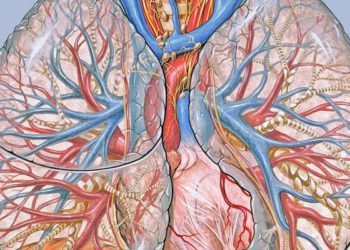Higher plasma levels of omega-3 fatty acids not associated with worse cardiovascular outcomes compared to corn oil placebo
1. Eicosapentaenoic acid (EPA) levels from treatment with omega-3-fatty acids were not associated with changes in cardiovascular (CV) outcomes compared to corn oil placebo, regardless of the plasma EPA level.
2. Higher docosahexaenoic acid (DHA) plasma levels were not associated with an increase in CV events.
Evidence Rating Level: 1 (Excellent)
Study Rundown: The evidence regarding the effects of eicosapentaenoic acid (EPA) and docosahexaenoic acid (DHA) on cardiovascular (CV) outcomes is mixed. The REDUCE-IT trial randomly administered EPA or mineral oil placebo and reported a reduction in CV outcomes in EPA-treated individuals. Conversely, the STRENGTH trial randomly administered omega-3-carboxylic acid (CA), which increases EPA and DHA plasma levels, or corn oil placebo and discovered no difference in CV outcomes between groups. This post hoc analysis of the STRENGTH trial evaluated the association between CV outcomes and EPA and DHA levels. There were no significant differences in CV events between the highest tertile of plasma EPA levels or the highest tertile of plasma DHA levels compared to corn oil placebo. Changes in achieved plasma EPA and DHA levels from baseline were also analyzed; there were no increases in the concentration of either fatty acid that yielded significantly more CV outcomes compared to corn oil placebo. Analysis of the STRENGTH trial demonstrated no reduction in risk for CV events from any increase or change in EPA plasma levels along with no increase in harm due to any increase or change in DHA levels. One limitation of this study, however, is that there was an association between EPA and DHA levels, which prohibits complete independent analysis of either fatty acid level.
Click to read the study in JAMA Cardiology
Relevant Reading: Cardiovascular risk reduction with icosapent ethyl for hypertriglyceridemia
In-Depth [randomized controlled trial]: This was a post hoc analysis of the STRENGTH trial. The STRENGTH trial was conducted at 675 centers and enrolled 13 078 participants from October 30, 2014, to June 14, 2017. Fatty acid levels were measured at study enrollment and 12-month follow-up, and data was available at both time intervals in 10 382 participants (median [SD] age: 62.5 [8.9] years). Participants who were treated with omega-3-CA were divided into three tertiles based on plasma EPA cut-offs. The primary endpoint was a CV-related event (CV death, nonfatal myocardial infarction, nonfatal stroke, coronary revascularization, or unstable angina requiring hospitalization). A CV event occurred in 574 out of 5207 (11.0%) participants who received corn oil and 575 out of 5175 (11.1%) treated with omega-3-CA. The highest EPA plasma level tertile (>116.4 mg/mL) experienced a CV event in 194 out of 1715 participants (11.3%; adjusted HR: 0.98; 95% CI: 0.83-1.16; p= 0.81). Omega-3-CA-treated participants were also categorized into tertiles based on plasma DHA levels. The highest DHA plasma level tertile (>105.2 mg/mL) experienced a CV event in 196 out of 1718 participants (11.4%; adjusted HR: 1.02; 95% CI: 0.86-1.20; p= 0.85).
Image: PD
©2021 2 Minute Medicine, Inc. All rights reserved. No works may be reproduced without expressed written consent from 2 Minute Medicine, Inc. Inquire about licensing here. No article should be construed as medical advice and is not intended as such by the authors or by 2 Minute Medicine, Inc.





![Reinnervation of cardiac infarcts decreases subsequent arrhythmia incidence [PreClinical]](https://www.2minutemedicine.com/wp-content/uploads/2015/02/1280px-Heart_ant_wall_infarction-75x75.jpg)

